For ‘Anna in the Tropics,’ Rinaldo Chico Guido gets deadly serious
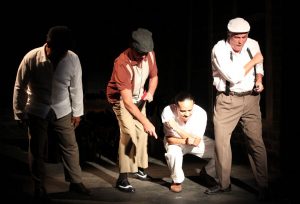 In celebration of Hispanic Heritage Month, the Laboratory Theater of Florida is producing the Southwest Florida premiere of Anna in the Tropics. Playing the role of Cheche is Ronaldo Chico Guido.
In celebration of Hispanic Heritage Month, the Laboratory Theater of Florida is producing the Southwest Florida premiere of Anna in the Tropics. Playing the role of Cheche is Ronaldo Chico Guido.
The story of Anna in the Tropics takes place in a family-owned and operated cigar factory located in Ybor City in the 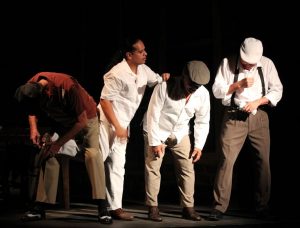 summer of 1929, just a few short months prior to the stock market crash on October 29 that precipitated the Great Depression. But at this point in time, the cigar industry in Tampa was still enjoying its golden era. Ybor City’s 200-plus cigar companies accounted for the production of 600 million cigars annually, and the character of Cheche is determined to increase their share of the U.S. cigar market by introducing mechanization to
summer of 1929, just a few short months prior to the stock market crash on October 29 that precipitated the Great Depression. But at this point in time, the cigar industry in Tampa was still enjoying its golden era. Ybor City’s 200-plus cigar companies accounted for the production of 600 million cigars annually, and the character of Cheche is determined to increase their share of the U.S. cigar market by introducing mechanization to 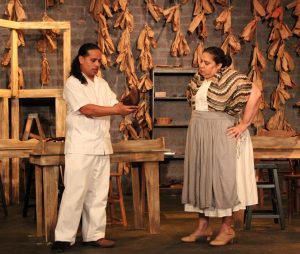 cigar manufacturing, as was occurring already in factories in New York and New Jersey and other northern cities.
cigar manufacturing, as was occurring already in factories in New York and New Jersey and other northern cities.
Cheche doesn’t just want to automate the business, he wants to modernize it. And that means eliminating the tradition of having a lector read to the workers as they roll cigars. But Cheche’s has a not-so-hidden agenda underlying his insistence on eliminating the lector. It turns out that his own wife, 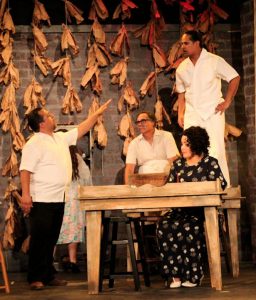 Mildred, ran off with a previous lector and “now Cheche is against all lectors and the love stories they read.”
Mildred, ran off with a previous lector and “now Cheche is against all lectors and the love stories they read.”
To his enduring vexation, Cheche is unable to simply impose his will in the matter as he only owns a minority share of the company. The principal owners are his half-brother, Santiago, and his powerful wife, Ofelia, and they are not only against modernization, they want to preserve the historic origins of the cigar business as it evolved in Havana from the time of the Spanish occupation in the last half of the 19th Century.
But there is more involved than mere resistance to change.
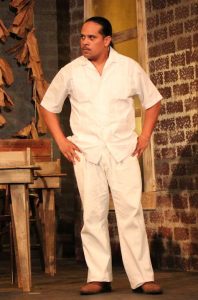 Cheche (whose given name is Chester) is an outsider. Half Cuban, but also half American, the fracture runs deeper than genetics. His focus on mechanization, automation and modernity is seen as fundamentally American in ilk – more in the tradition of reviled pioneers of mass production such as Eli Whitney, Ransom E. Olds and Henry Ford than revered Cuban cigar manufacturer Vicente Martinez-Ybors. And so Cheche is relegated to the periphery, constrained to stand on the perimeter looking in during social interactions and parties, which augments the loneliness and isolation he feels following abandonment by his wife.
Cheche (whose given name is Chester) is an outsider. Half Cuban, but also half American, the fracture runs deeper than genetics. His focus on mechanization, automation and modernity is seen as fundamentally American in ilk – more in the tradition of reviled pioneers of mass production such as Eli Whitney, Ransom E. Olds and Henry Ford than revered Cuban cigar manufacturer Vicente Martinez-Ybors. And so Cheche is relegated to the periphery, constrained to stand on the perimeter looking in during social interactions and parties, which augments the loneliness and isolation he feels following abandonment by his wife.
Today, we are confronted regularly by the violence wrought by men who find themselves 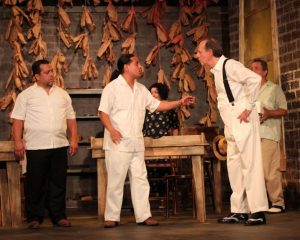 socially isolated and lack the social connections the rest of us take for granted. People who feel outcast, isolated, despondent and hopeless are capable of cruel and heinous crimes, and the Anna in the Tropics audience is left to decide whether it is this that playwright Nilo Cruz is portraying through the character of Cheche or something more malicious and profound – the violence that can be directed by American culture against
socially isolated and lack the social connections the rest of us take for granted. People who feel outcast, isolated, despondent and hopeless are capable of cruel and heinous crimes, and the Anna in the Tropics audience is left to decide whether it is this that playwright Nilo Cruz is portraying through the character of Cheche or something more malicious and profound – the violence that can be directed by American culture against 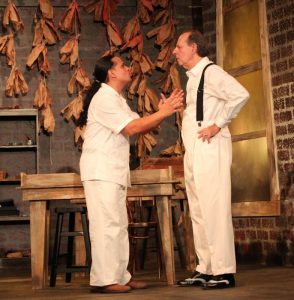 immigrants who fail to assimilate as quickly or completely as society demands.
immigrants who fail to assimilate as quickly or completely as society demands.
Choose the metaphor that most resonates with you!
As you can see from the foregoing, the character of Cheche is a meaty role, and Ronaldo Chico Guido makes the most of it, turning in a believably mercurial performance of the emotionally broken antagonist of Anna in the Tropics.
It’s a serious part, which is highly ironic as in real life Rinaldo is a premier local comedian who’s been characterized as a rising 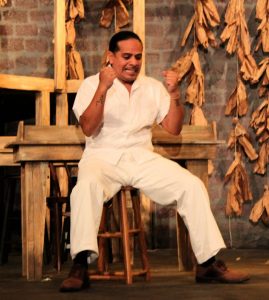 comedic star. You may have seen his stand-up act at any one of several venues, including the Rhythm House Lounge in Fort Myers, Off The Hook Comedy Club in Naples or Visani Comedy Theater in Port Charlotte.
comedic star. You may have seen his stand-up act at any one of several venues, including the Rhythm House Lounge in Fort Myers, Off The Hook Comedy Club in Naples or Visani Comedy Theater in Port Charlotte.
Born in Nicaragua, he was raised between Miami and Memphis. In between, he developed a pronounced love for art and self-expression. A veteran, Ronaldo served two enlistments in the U.S. Army. He has a Bachelors Degree cum laude from Florida Gulf Coast University, where he studied political science and philosophy.
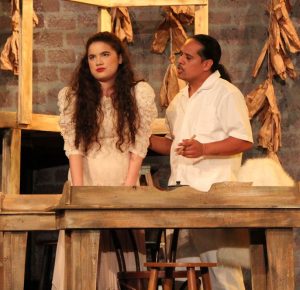 [N.B.: Playwright Nilo Cruz references the threat to cigar manufacturing posed by the emerging cigarette industry and Americans’ proclivity for rushing through life, which obviates taking the time to savor the taste and aroma of a fine cigar. But the depression that followed the stock market crash on October 29, 1929 heralded the decline of the cigar industry, which was finally dealt a death blow in 1962 by the Cuban trade embargo. Within months, nearly 200 of Ybor City’s original 200 manufacturers closed their doors.]
[N.B.: Playwright Nilo Cruz references the threat to cigar manufacturing posed by the emerging cigarette industry and Americans’ proclivity for rushing through life, which obviates taking the time to savor the taste and aroma of a fine cigar. But the depression that followed the stock market crash on October 29, 1929 heralded the decline of the cigar industry, which was finally dealt a death blow in 1962 by the Cuban trade embargo. Within months, nearly 200 of Ybor City’s original 200 manufacturers closed their doors.]
RELATED POSTS.













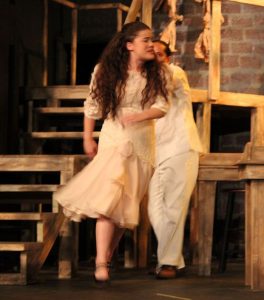

 Tom Hall is both an amateur artist and aspiring novelist who writes art quest thrillers. He is in the final stages of completing his debut novel titled "Art Detective," a story that fictionalizes the discovery of the fabled billion-dollar Impressionist collection of Parisian art dealer Josse Bernheim-Jeune, thought by many to have perished during World War II when the collection's hiding place, Castle de Rastignac in southern France, was destroyed by the Wehrmacht in reprisal for attacks made by members of the Resistance operating in the area. A former tax attorney, Tom holds a bachelor's degree as well as both a juris doctorate and masters of laws in taxation from the University of Florida. Tom lives in Estero, Florida with his fiancee, Connie, and their four cats.
Tom Hall is both an amateur artist and aspiring novelist who writes art quest thrillers. He is in the final stages of completing his debut novel titled "Art Detective," a story that fictionalizes the discovery of the fabled billion-dollar Impressionist collection of Parisian art dealer Josse Bernheim-Jeune, thought by many to have perished during World War II when the collection's hiding place, Castle de Rastignac in southern France, was destroyed by the Wehrmacht in reprisal for attacks made by members of the Resistance operating in the area. A former tax attorney, Tom holds a bachelor's degree as well as both a juris doctorate and masters of laws in taxation from the University of Florida. Tom lives in Estero, Florida with his fiancee, Connie, and their four cats.